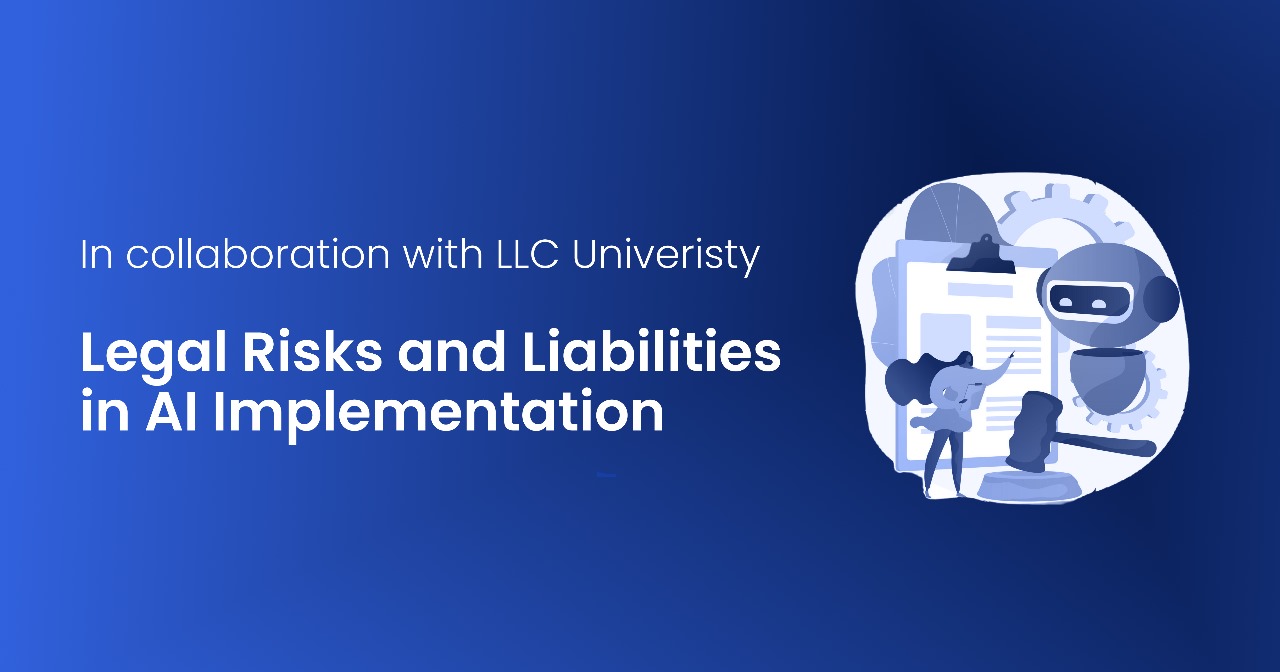Understand the legal implications of AI implementation and what businesses must consider to minimize liability and ensure compliance.

Over the past couple of years, the rise of artificial intelligence (AI) has been far and away the most noteworthy tech trend, dwarfing anything else in terms of overall impact and disruption. In fact, it’s difficult to think of an industry that has not been rocketed by the implementation of AI, which provides countless options for working more strategically and more efficiently.
While AI certainly has its advantages, it can also have some potential drawbacks. For a technology so new and so disruptive, it goes without saying that there are some significant legal risks and liabilities to consider. Let’s outline just a few of them.
Today’s online users are increasingly wary about the ways in which their personal data is being harvested, stored, and used. This is a potential problem for AI implementation, as AI really thrives when it has access to huge quantities of information.
Businesses that collect data for AI applications will need to be meticulous in conveying their data collection standards to the end user, ensuring compliance with data protection regulations such as GDPR (EU) or CCPA (California). Failure to take user privacy concerns seriously can result in reputational damage along with major legal fines.
AI can be used to generate or iterate all kinds of content, from written content to visual art. It’s important to remember, however, that these processes draw from content that’s already available on the Web or elsewhere. This can potentially raise some intellectual property concerns.
Small businesses implementing AI should be well aware of issues related to the ownership of AI-generated inventions or content, and the potential infringement of existing patents or copyrights. Again, there is much risk for both reputational damage and severe legal penalties.
Many businesses use AI to help power their decision-making. But while AI does allow for a more data-driven approach to decision-making, that hardly means it is exempt from any kind of bias. On the contrary, AI comes with a reasonably high risk of prejudicial outcomes. This can potentially lead to violations of anti-discrimination laws, such as those related to employment or lending.
All too often, business owners assume that such outcomes are impossible, presuming that AI is, by nature, unbiased. It’s critical to remember that even an algorithm can have blind spots, especially when drawing from faulty or incomplete data sets.
More broadly, AI can raise questions about accountability and responsibility. Simply put, businesses may be faced with inquiries about exactly who is responsible for decisions that have ostensibly been made by AI. The answers to these inquiries are often quite complex.
This can encompass issues of liability if an AI system causes harm or violates legal standards, as in some of the examples we’ve noted above. The legal disputes that emerge can compound any of these other AI-related challenges.
While we’re focusing on broad legal risks for AI implementation, it’s important to note that there can also be some narrower risks associated with specific industries or sectors. As such, it’s always important for businesses to consult with their legal team about any quirks of their particular regulatory environment.
Certainly, different verticals have their own unique regulations that may apply to AI systems, such as healthcare (HIPAA in the US), finance (SEC regulations), or autonomous vehicles. These regulations are subject to constant evolution and change which makes due diligence a key factor for any type of AI implementation.
One more legal liability worth knowing about is the potential for violations of consumer protections.
Specifically, AI implementations that are used in consumer-facing settings must adhere to consumer protection laws. The main concern here is ensuring transparency about how AI decisions are made, and avoiding deceptive or misleading practices (of course, the same concerns about privacy and data protection still apply).
As you consider different ways to mediate your legal risk, due diligence is obviously key. But another step you can take is to register your business as an LLC.
LLCs are popular legal formations for small businesses, precisely because they offer legal liability protections. When you register your business as an LLC, you create a legal entity that is distinct from you and your business partners, which means you can keep personal assets and liabilities separate from your business ones. It also means you can separate your personal affairs from your business affairs, should any legal risk come your way.
There are also a number of other advantages to LLC registration, such as ease of setup and pass-through taxation. As for how to establish your business as an LLC, the steps can vary according to your state, but generally go something like this:
This simple process can provide some significant legal protections, which are all the more valuable if you’re getting serious about AI.
It’s clear that AI is here to stay, yet just as clear that the AI field is ever-changing… not just in terms of the technology, but in terms of the regulatory landscape too. Stay on top of AI-related issues as you consider implementing this technology on behalf of your business.
Top quality ensured or we work for free
